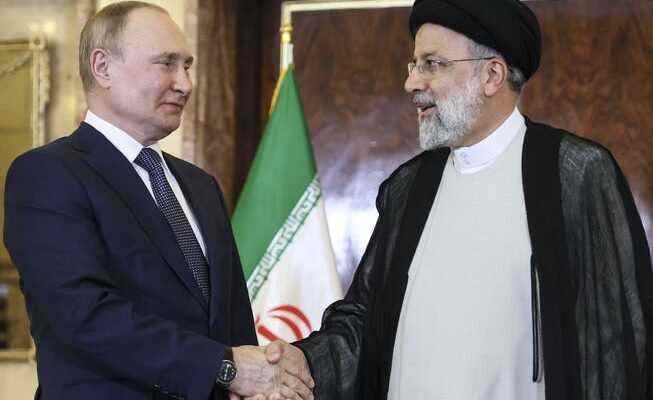The three-way summit with Erdogan and Raisi is primarily about the conflict in Syria. In the background, however, arms deals, oil production and the war in Ukraine are also being negotiated.
Iran’s President Ebrahim Raisi greets his Russian counterpart Vladimir Putin at Tehran’s Saadabad Palace.
Turkey, Russia and Iran are deeply opposed in the region’s numerous conflicts, whether in Syria, Iraq or the Caucasus. They have managed to keep the competition for zones of influence under wraps. But they could not resolve their conflicts. Russia’s attack on Ukraine hasn’t made the complicated triangular relationship any easier.
On Tuesday, Russian President Vladimir Putin and Turkish President Recep Tayyip Erdogan met their Iranian counterpart Ebrahim Raisi for a tripartite summit in Tehran. Both Putin and Erdogan also met with the Iranian revolutionary leader Ayatollah Ali Khamenei, who has the last word in Iran on all crucial issues. For Putin, it was only the second trip abroad since the attack on Ukraine in February, but it was the third meeting with Raisi since the beginning of the year.
Risky Russian investments
For Putin, it’s all about demonstrating strength given his isolation in the West. Even before he arrived in Tehran, Iran’s state-owned oil company and Gazprom signed a memorandum of understanding that would see the Russian energy giant invest $40 billion in Iran’s oil and gas sector over the next few years. According to their own statements, the Iranians have so far signed contracts with Russian oil companies worth four billion dollars to develop seven oil fields.
Since the Americans and Europeans tightened their sanctions against Russia, the Iranians and the Russians have been courting for the same sales markets in Asia. Both offer their oil on special terms, with the Russian selling more because of its better quality. Observers therefore see the agreement more as a political signal. “The level of the deal signals that Russia and Iran want Western governments to take their shared economic ambitions seriously,” said Esfandyar Batmanghelidj, head of the Bourse & Bazaar Foundation, a think tank specializing in economic issues.
In the event of economic relations with Iran, companies and banks risk coming into conflict with US sanctions. In the past, Russian companies had concluded investment agreements worth billions with Iran. However, the contracts were not implemented. Even during the far better trading conditions between 2016 and 2018, when the Iran nuclear deal was in effect, Russian banks were reluctant to fund deals with Iran, Batmanghelidj says. With the announcement on Tuesday, Russia wanted to demonstrate that it could find new partners despite the sanctions against its oil industry. “But I don’t think Russian companies are taking steps that could trigger secondary sanctions just to invest in Iran’s oil industry.”
Iran denies delivering drones to Russia
Eight memoranda of understanding between Turkey and Iran, which Erdogan and Raisi signed on Tuesday, could be similar. According to these, Tehran and Ankara want to increase the trading volume from the current 7 to 30 billion dollars. Much will depend on whether the nuclear agreement can still be saved.
The tripartite summit took place just a few days after American President Joe Biden’s trip to the Middle East. He tried to swear the Arab Gulf states, as well as Egypt, Jordan and Iraq, into an alliance against Russia, China and Iran, sometimes with the participation of Israel. Iran wants to subvert this with its own diplomatic efforts. According to American sources, the Iranians are ready to sell hundreds of drones to Russia for its war against Ukraine. The Iranians deny this and introduced themselves as mediators in the war.
Turkey has been trying to mediate for months – without success. As the Kremlin confirmed, the meeting between Erdogan and Putin was also about the planned “wheat corridor” for exporting Ukrainian grain through the Black Sea. Russia has been blocking grain exports from Ukraine for months, which has led to an explosion in bread prices, especially in the Middle East. The Turkish proposal would allow Ukrainian ships to transit the Black Sea via an agreed route.
Iran rejects Turkish offensive in northern Syria
Thousands of Iranians have protested against high bread and food prices in recent weeks. But for the Iranian leadership, Syria is strategically more important than Ukraine. This conflict was the subject of the meeting between Raisi, Putin and Erdogan in the so-called Astana format. For weeks Erdogan has been threatening an invasion against the Kurdish People’s Protection Units (YPG), which together with their Arab allies control the north-east of the country and a small area around Tell Rifat near Aleppo.
In rarely clear words, Khamenei rebuffed the Turkish president. “A military attack in northern Syria would harm Syria, Turkey and the entire region,” Khamenei said. Nor would it persuade the Syrian government to make the concessions that Turkey is hoping for. Turkish and Syrian representatives have been holding talks for some time. Tehran – and Moscow too – is concerned with strengthening the Syrian ruler Bashar al-Asad and thus their influence. Syrian Foreign Minister Faisal Mekdad was also expected in Tehran on Tuesday night.
